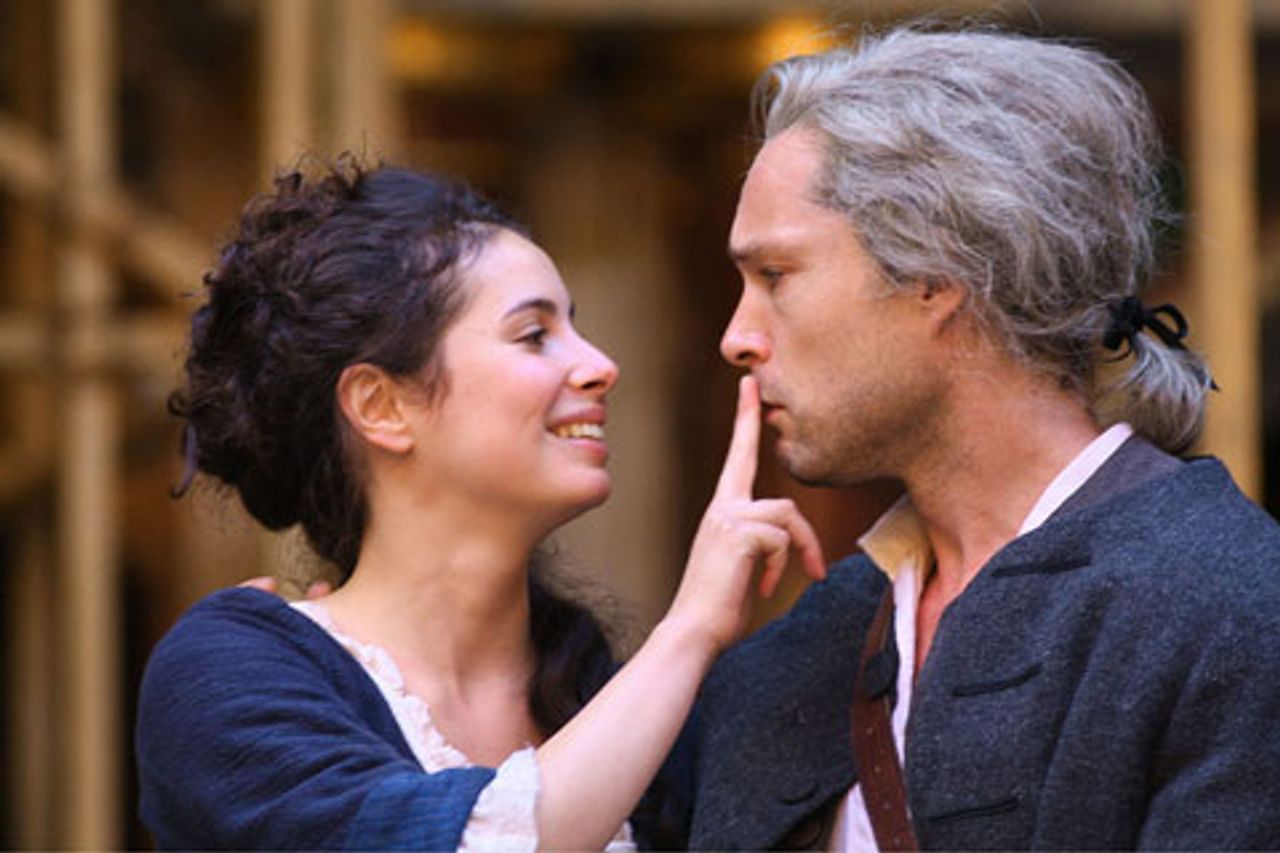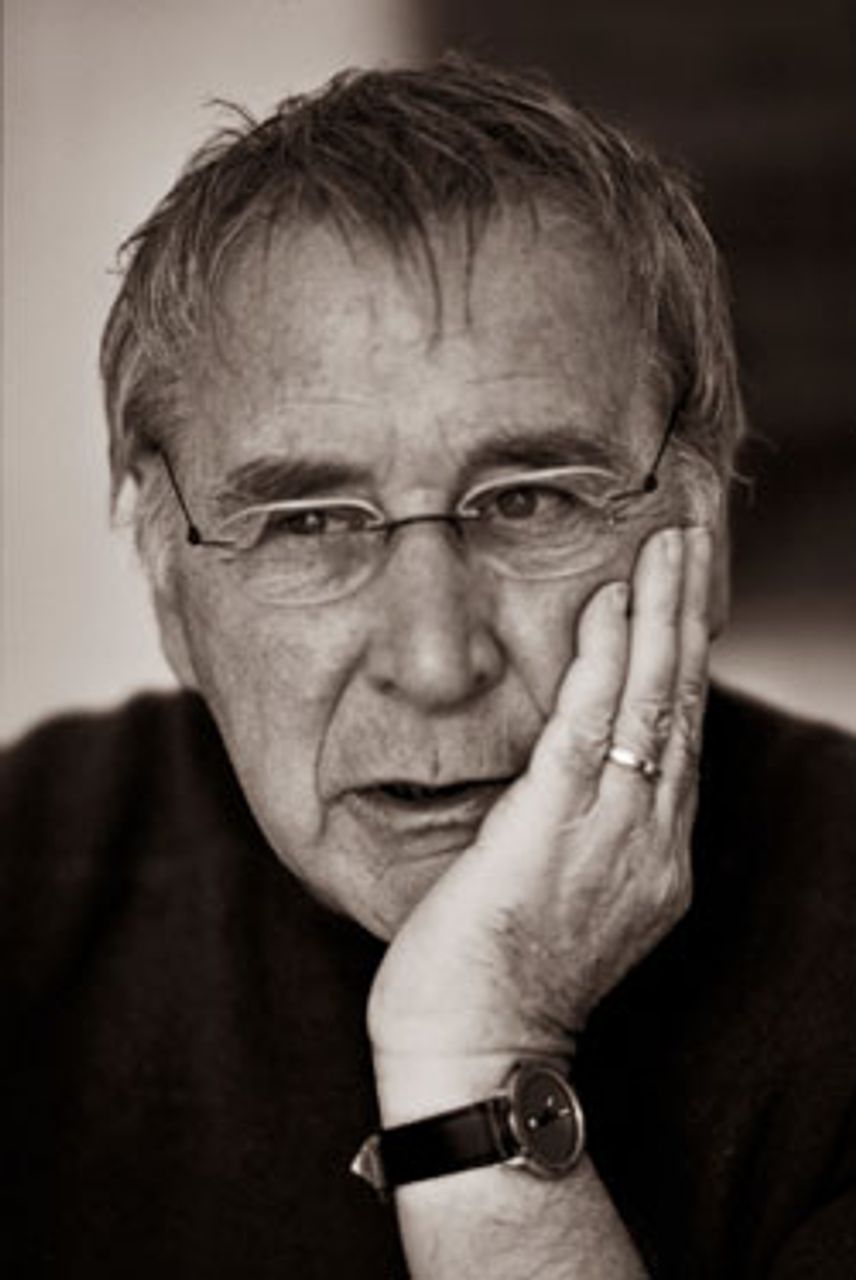A New World: A Life of Thomas Paine, by Trevor Griffiths, at the Globe Theatre in London until 9 October 2009
Trevor Griffiths’ A New World: A Life of Thomas Paine brings to the stage an 18th century figure who made a significant contribution to both the American and French revolutions and whose writings have continued to influence revolutionary movements ever since. Griffiths’ play will introduce thousands to Thomas Paine, the man who wrote the Rights of Man in defence of the French Revolution and Common Sense, whose The American Crisis was read to Washington’s troops on the eve of the battle of Trenton which marked a turning point in the War of Independence.
 Alix Riemer as Carnet and John Light as Thomas Paine in A New World: A Life of Thomas Paine (Photo: John Haynes)
Alix Riemer as Carnet and John Light as Thomas Paine in A New World: A Life of Thomas Paine (Photo: John Haynes)We follow Paine over a 30-year period as Griffiths takes us from his emigration to America in 1774 to his death in 1809. This is a large slice of time to fit into one evening and covers epochal events, but Griffiths deftly knits biography and history together in a play which engages both the intellect and the emotions of its audience. This is a play that takes its subject seriously and takes its audience seriously.
Paine is often referred to as the “forgotten Englishman,” but he was a citizen of both America and France and it would be more accurate to regard him as a citizen of the world. Some people are forgotten because their ideas have a diminishing relevance or because their celebrity was a superficial feature of a particular age, but Paine’s ideas have not sunk into a natural and deserved oblivion. His neglect is a much more constructed phenomenon that expresses just what an uncomfortable figure he remains in a period when many of the social inequalities and forms of oppression about which he wrote still exist, or have taken on new forms.
Paine was born in Thetford, Norfolk in 1737. Leaving school at the age of 12 he was apprenticed as a staymaker and later became an excise man in Lewes, Sussex. By the time he sailed for America he was bankrupt, had no settled employment and apparently no prospects. What made the penniless man into Thomas Paine was the revolutionary crisis that was reaching its peak as he disembarked. Griffiths is right to choose this as the start for his play. This is the point at which Paine steps into history and, as Griffiths shows, it is even when he gets his name because a printer adds an “e” to it in his first published article.
Print shops figure largely in A New World. There is the printers’ shop of the Pennsylvania Magazine and later we see Paine in the Paris print shop of the revolutionary paper La Bouche de Fer. These are not merely background scenes; they are part of Paine’s character. Arriving in Pennsylvania he is a working man, confident enough of his skill to negotiate a job for himself in this new world. In Paris we see the physical effort it takes to bring out a thrice-weekly paper in the tired bodies of the revolutionaries asleep alongside their press. Griffiths gives a tangible sense of the importance of papers, pamphlets and magazines to these first modern revolutions and of the role that Paine played as a writer in giving voice to social layers that were normally excluded from political life.
Griffiths’ play is an adaptation of the screenplay he wrote for Richard Attenborough, who has long planned to film the life of Thomas Paine. Griffiths published it as These are the Times: a Life of Thomas Paine in 2005 when it seemed that the film would never be made. Since then it has been adapted as a BBC radio play and now for the stage. The changes Griffiths has made for the stage are far greater than those in the radio play. Not least he has had to cut one and a half hours from the text. Yet Paine the writer emerges from that process more clearly defined. In the screenplay Paine wears a wooden pen in his jacket lapel to indicate his trade. In the play the physical presence of the press on the stage makes the same statement.
For a man who spent so much of his time in the thick of often frantic activity, there is a certain loneliness and isolation about Paine. It is, in part, the result of a patchy and heavily biased historical record, but also probably expresses something about the nature of Paine as a writer. There are points at which Paine the writer and Griffiths the writer shade into one another. All writers must inevitably use themselves and their own experience as the basis for any character they create, but Griffiths’ depiction of Paine takes on the character of a protracted examination of the writer’s relationship to the dominant theme of Griffiths’ own work―revolution.
John Light who plays Thomas Paine conveys this sense of containment and reserved passion with great skill. He reveals most about the inner feelings of his character in his interaction with the child characters Lotte, played by Julia Reinstein, and Will (Daniel Anthony), and the three women in Paine’s life, Philly (Jade Williams), Marthe (Laura Rogers) and Carnet played by Alix Riemer.
With the children, the almost child-like innocence of Paine’s own character emerges. Their quest for knowledge is his. Will, a slave boy, accompanies Paine through the streets of Philadelphia as a younger equal bearing his globe from one set of lodgings to another.
In one of the most powerful moments of the play Paine returns to Philadelphia to find that Will has been hung by the British. The dramatic effect is all the greater because it takes place among the standing spectators in the yard of the theatre. The Globe is a reconstruction of Shakespeare’s Globe and seems to have given Griffiths possibilities in adapting his screenplay for the stage that a more conventional modern theatre could not. The actors push their way through the crowd as though the audience were participants in the scene.
The female characters each have their own story. Griffiths has created three-dimensional women, whose struggles provide painful insights into the impact of class society on those whom it oppresses. Paine relates to each woman as an equal and each responds in her own way. Philly, the abused prostitute, saves his life when he is carried off the ship at Philadelphia sick with fever. Marthe makes a fair copy of Common Sense, but cannot accept a relationship that is not sanctioned by society. Of the three, only Carnet can respond freely to Paine. Riemer’s portrayal lit up the stage.
One of the finest scenes involves the French revolutionary Danton, vividly realised by James Garnon, making a speech to the Cordeliers Club―in French―while Carnet, thinly disguised as a man, simultaneously translates for Paine. The scene conveys in seconds the elemental character of a revolution. What a film would have shown in expensive crowd scenes, Griffiths and director Dominic Dromgoole have achieved with far greater economy of resources.
 Trevor Griffiths (Photo: Jo Clauweart)
Trevor Griffiths (Photo: Jo Clauweart)Central to Griffiths’ achievement is his ability to create characters that are rooted in the history of the period, but psychologically credible and moving to a modern audience. He is able to carry the audience through the historical complexities of the period without being didactic because the issues that arise are issues for the characters themselves. Paine and Jefferson (Jamie Parker) discuss the drafting of the Declaration of Independence against the background of fidgeting children. Paine and Danton discuss the nature of revolution while the great orator dresses and applies kohl to his eyes to increase the dramatic effect of the speech he is about to make. One has the sense that these characters are grappling with these great questions of modern history for the first time. With Griffiths, history is not something that happened and about which he is going to inform us. It is something which unfolds each night at the Globe.
His achievement in adapting a work written for the highly naturalistic medium of film to the stage is considerable. He achieves it with a mastery of his art that obscures the complexity of the task. He has used song―the music is by Steven Warbeck―and extended the role of Benjamin Franklin, played to great effect by Keith Bartlett, as a narrator. Neither of these techniques seems forced. They draw the audience into an all-enveloping theatrical experience.
This year marks the bicentenary of Paine’s death and Griffiths’ A New World: A Life of Thomas Paine has for that reason alone a current relevance. But it has a more profound contemporary resonance because of the themes it addresses. Paine was writing about a society characterised by widening social inequalities. A wealthy oligarchy of City magnates and landed aristocrats had entrenched itself in Britain as the first British Empire reached its height with the defeat of France in the Seven Years War. In France the aristocracy seized the opportunity presented by the weakness of royal power to strengthen their own position and extend their control over the peasantry. These were the class forces against which Paine contended with his writings.
Paine himself appears in Griffiths’ play as an unassuming workingman. There is none of the self-conscious theatricality of Danton about him. But Paine’s writings, of which some powerful sections are voiced during the play, represent his inner core, the essence of Paine’s being as a revolutionary. They have an enduring relevance and in presenting them as he does Griffiths has demonstrated a tenacity to his principles in a period of political reaction that is worthy of Paine himself.
In years to come those who have seen Griffiths’ A New World: A Life of Thomas Paine will remember it as an event that had significance far beyond the confines of the theatre. Historians may note it as one of the indications that, as the effects of the recession still reverberated across the river in the City of London, the meaning of revolution was being seriously discussed once more. This is a courageous and farsighted piece of theatre that connects to the events and concerns of our own time as well as it evokes the history of revolutionary struggles in the 18th century.
The author also recommends:
Citizen of the world: a brief survey of the life and times of Thomas Paine (1737-1809)
[8 June 2009]
Trevor Griffiths’ These are the Times: a Life of Thomas Paine
A great film yet to be made
[21 February 2008]
Trevor Griffiths and David Walsh discuss “The Writer and Revolution”
[13 November 2008]
